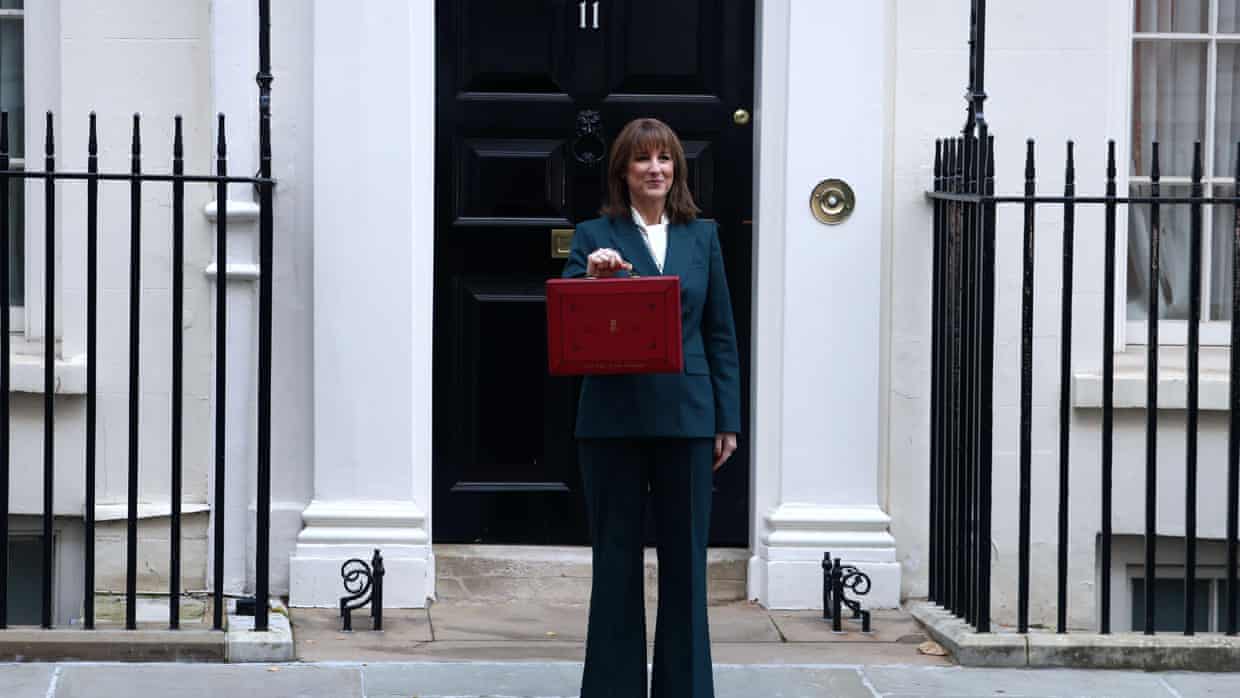Starmer says budget did not break manifesto tax pledge – as it happened
In an interview Keir Starmer also rejected suggestions Labour broke its manifesto promise on tax.When this was put to him, he told Sky News:We kept to our manifesto in terms of what we’ve promised.But I accept the challenge that we’ve asked everybody to contribute.But he also defended the need to raise taxes.Explaining why, he told the BBC:I tell your viewers precisely why that is: to make sure that we can protect our NHS, which needs to be there for them and their families when they need it.
Everybody understands that.We want to make sure that we have got schools which are fit for the future so that every child can go as far as their talent will take them, and I absolutely wanted to bear down and reduce the cost of living, because for most of your viewers that will be the single most important thing.BREAKING: Sir Keir Starmer has insisted Labour "kept to our manifesto" promises despite raising taxes in the budget - as he asked "everybody to contribute".🔗 Read more https://t.co/RvJTYs2Xg6The government is to ditch its flagship policy from the workers’ rights bill, removing the right to protection from unfair dismissal from the first day of employment and replacing it with a six-month threshold.
Rachel Reeves has positioned Labour to fight the next general election with tax increases and spending cuts that resemble a work of “fiscal fiction”, an analysis by leading economists has warned.Keir Starmer has conceded that the budget “asked everybody to contribute” but argued that it had “done it in a fair way” as he sought to rebuff claims that Labour had broken its tax promises.Net migration to the UK has fallen by more than two-thirds to 204,000 in a single year, the lowest annual figure since 2021, according to the latest official statistics.For a full list of all the stories covered on the blog today, do scroll through the list of key event headlines near the top of the blog.Business groups have welcomed the government’s U-turn on day one protection from unfair dismissal.
In a joint statement, six groups said:Businesses will be relieved that the government has agreed to a key amendment to the employment rights bill which can pave the way to its initial acceptance.We welcomed this chance to hold meaningful dialogue and believe the constructive nature of our discussions can be a template to resolve outstanding issues.Businesses have always been clear that making the employment rights ill work would take business, trade unions and government working together to find a landing zone for these major policy changes.This agreement keeps a qualifying period that is simple, meaningful, and understood within existing legislation.It is crucial for businesses confidence to hire and to support employment, at the same time as protecting workers.
This change addresses the key problem that must be sorted in primary legislation.It shows that dialogue works and is a model for how to consider the important questions that need answering in regulations before new rules come into force.The statement is issued on behalf of:British Chambers of CommerceChartered Institute of Personnel and DevelopmentConfederation of British IndustryFederation of Small BusinessesRecruitment and Employment ConfederationSmall Business BritainLabour’s manifesto said explicitly that the party would introduce day one protection from unfair dismissal.It said:Labour will stop the chaos and turn the page to create a partnership between business and trade unions, by implementing ‘Labour’s Plan to Make Work Pay: Delivering a New Deal for Working People’ in full – introducing legislation within 100 days.We will consult fully with businesses, workers, and civil society on how to put our plans into practice before legislation is passed.
This will include banning exploitative zero hours contracts; ending fire and rehire; and introducing basic rights from day one to parental leave, sick pay, and protection from unfair dismissal.It is hard to see how this latest U-turn isn’t a manifesto breach – happening as the government is widely accused of breaching its manifesto pledge on tax.Paul Nowak, the TUC general secretary, has said that the priority for workers is to get the employment rights bill on the statute book.While not exactly welcoming the government’s U-turn (see 5.19pm), he suggested that there is at least now a good chance that the bill will quickly become law.
He said:The employment rights bill is essential to better quality, more secure jobs for millions of workers across the economy,The absolute priority now is to get these rights – like day one sick pay - on the statute book so that working people can start benefiting from them from next April,Following the government’s announcement, it is now vital that peers respect Labour’s manifesto mandate and that this bill secures royal assent as quickly as possible,MPs voted three times to put day one protection from unfair dismissal in the employment rights bill,But three times peers voted to remove this provision.
The last Commons vote was in early November and, in theory, this “ping pong” process could have gone on for weeks.MPs are due to vote on the bill again on 8 December, and it is likely that the bill will swiftly pass the Lords and become law after that.Here is the news release from the Department for Business and Trade explaining the employment rights bill U-turn.And here an extract.The government convened a series of constructive conversations between trade unions and business representatives.
On the basis of the outcome of these discussions, the government will now move forward on the issue of unfair dismissal protections in the employment rights bill to ensure it can reach royal assent and keep to the government’s published delivery timeline.This will mean delivering day one rights to sick pay and paternity leave in April 2026 as well as launching the Fair Work Agency.Reforms to benefit millions of working people, including some of the lowest paid workers, would otherwise be significantly delayed if the bill does not reach royal assent in line with our delivery timetable.Businesses too need time to prepare for what are a series of significant changes.The discussions concluded that reducing the qualifying period for unfair dismissal from 24 months to 6 months (whilst maintaining existing day one protection against discrimination and automatically unfair grounds for dismissal) is a workable package.
It will benefit millions of working people who will gain new rights and offer business and employers much needed clarity.To further strengthen these protections, the government has committed to ensure that the unfair dismissal qualifying period can only be varied by primary legislation and that the compensation cap will be lifted.In the news release DBT stresses that this is a concession agreed with “businesses and unions”.It says:The government was pleased to facilitate these discussions and to set an example of the benefits of working together, and remains committed to continue engaging with trade unions, business and employers to make working lives better, support businesses and, vitally, deliver economic growth and good job creation.Jessica Elgot is the Guardian’s deputy poltical editor.
The government is diching its flagship manifesto policy from the employment rights bill, removing the right to day one protection from unfair dismissal and replacing it with a six-month threshold.The move comes after the business secretary, Peter Kyle, told businesses at the CBI conference that he would listen to concerns about the effects of the law change on hiring.Kyle, who replaced Jonathan Reynolds as business secretary who had previously steered through the legislation with the former deputy prime minister Angela Rayner, committed to ensure that businesses would not “lose” as a result of the changes, which include a ban on zero-hour contracts and day-one protections for workers against unfair dismissal.He told the CBI:I will not allow it to become zero-sum, [you] give one to the other, the other loses … This has to be got right.A union source said the changes had been agreed to allow the bill to progress faster through the House of Lords which has significantly delayed the legislation.
It will mean that the qualifying period for unfair dismissal will be reduced from two years to six months – but the bill had originally promised that period would be removed entirely.Instead the government had proposed a lighter touch probation period that businesses could use instead – but limited in law to nine months.That will now be removed and the law will make it impossible to claim unfair dismissal if an employee has been in post for less than six months.Unions insisted they had won concessions including on costs but the move is likely to spark anger amongst leftwing Labour MPs who saw the employment rights bill as one of their key offerings.The bill has been amended three times by Tory and Liberal Democrat peers in the Lords to accommodate key business demands and Kyle had said he would do “what it takes” to unblock parliamentary hold-ups to the bill because of the Lords amendments, before then consulting on its implementation.
He told the CBI:The voice of business, the voice of people who work in business, will be heard when we get down into the weeds of implementing those key parts of the employment rights bill.And yes, I’m talking about zero-hours contracts and day-one rights.Voters believe that Labour has broken its manifesto pledge not to raise any of the main taxes, by a margin of more than three to one, a YouGov poll suggests.Even Labour supporters are more likely to say the promise has been broken (45%) than not broken (25%) by a margin of almost two to one.If you are looking for a guide to what was in the budget that is very detailed and very clear, this 46-page summary from the House of Commons library is very good.
It also includes numerous links to briefing papers from the House of Commons libary that explain particular policy areas in depth.The government will take over full responsibility for special educational needs spending from local councils, it was revealed at the budget, prompting warnings that the Department for Education could be facing a £20bn timebomb in two years.Patrick Butler, Richard Adams and Rowena Mason have the story.This chart, from the Institute for Fiscal Studies, highlights the problem.Rachel Reeves has positioned Labour to fight the next general election with tax increases and spending cuts that resemble a work of “fiscal fiction”, the Institute for Fiscal Studies has said.
Richard Partington has the story.The charts from the IFS’s budget analysis are here.Rachel Reeves has summoned telecoms bosses to a meeting to demand more protection for consumers from mid-contract price hikes, PA Media reports.PA says:Reeves and technology secretary Liz Kendall said more must be done to ensure “hard-working consumers” do not face price rises they have not signed up to.They have told telecoms chief executives that “more needs to be done to protect consumers so that ordinary people feel empowered when engaging with the sector and confident they are getting a good deal”.
In a letter to bosses, the government has called on the sector to reinforce its commitment to treating customers fairly, including by confirming customers under contract will not face price rises beyond those that they signed up to.The ministers said they will shortly convene a roundtable with industry leaders to discuss further action to support customers, as well as areas where the Government can do more to drive investment in the UK’s digital infrastructure.The move follows increasing anger from customers and consumer groups over rising mobile and broadband tariffs.Last month Virgin Media O2 announced it would put up prices for 15.6 million of its mobile customers by £2.
50 a month from spring next year, having previously said the increase would be £1.80.Other operators including BT, TalkTalk and VodafoneThree have also announced above-inflation price rises for new customers or those who renew their contracts.They come after Ofcom changed its rules in January to ban inflation-linked mid-contract price rises for TV, broadband and mobile contracts.However, the regulator has continued to allow companies to put up prices if they expressed them as pounds and pence, considered clearer for customers than inflation-linked percentage terms.
Operators were also told they had to let customers know about increases in advance or give them 30 days to cancel contracts penalty free after any change,Downing Street has said it does not accept a claim from the Office for Budget Responsibility that its proposed digital ID scheme could cost almost £2bn,In its report yesterday, the OBR said:The implementation of digital ID cards is provisionally forecast to cost £1,8bn in total over the next three years, split across £0,5bn (day-to-day spending) and £1.
3bn (capital spending).Asked to confirm these figures, the PM’s spokesperson said:The number in the OBR forecast was an initial early estimate spread over a number of years.We don’t recognise it as an accurate cost of the programme, the scope of which is yet to be decided, let alone costed.Any costs in this spending review period will be met within existing settlements.The government will run a full consultation in due course.
Words can explain the budget quite well, but charts do it far better.Here are some of the most revealing from the Resolution Foundation’s budget analysis.1) The tax rises in the budget hit hardest towards the end of this parliament.2) No government has raised taxes so much in two budgets in a row since John Major was PM in the early 1990s.3) The nine-year freeze in the personal tax allowance has reversed 78% of the rise in the allowance that happened in the 2010s.
Raising the tax allowance was a key coalition policy, championed by George Osborne.Over time, freezing the allowance removes all the benefits (because of the impact of inflation).Rishi Sunak announced a four-year freeze, Jeremy Hunt extended it for two years, and Rachel Reeves has extended it for another three years.4) People on low incomes would have done better if Reeves had chosen to raise income tax by 1p in the pound, instead of freezing thresholds for three years.The Resolution Foundation says both measures would have raised about the same amount.
But the income tax rise would have been more progressive, particularly because of the sums raised from the highest paid.The thinktank says this shows “the manifesto tax pledge has cost working people”.(See 8.03pm.)5) Tax and benefit changes introduced since the election have been progressive.
Overall, the poorest households have gained, and wealthier households have lost out.The Treasury published its own distributional impact assessment yesterday which government changes look even more progressive – but that used a different methodology, including “benefits-in-kind from public services”.6) Children have gained most from the tax and benefit changes announced since the election.7) This parliament is set to be the second worst for improvements to real household disposable income since 1955.The worst was the 2019-2024 parliament.
Here is Rajeev Syal’s story on the fall in the net migration figures.(See 9.50am.)The Conservatives say the fall in net migration is largely down to visa restictions they introduced when they were in government.This is from Chris Philp, the shadow home secretary












